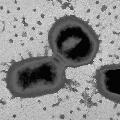



|
| This project is collaborated between The Forsyth Institute (TFI) and The Institute for Genomic Research (TIGR), and is funded by National Institute of Dental and Craniofacial Research (NIDCR) |
|
|
|||||||||||||||||||||||||
To the dental research communityAt present, more research papers, and more NIDR-funded grants are devoted to P. gingivalis than to other dental pathogens. Twenty-seven NIH grants with a primary focus on P. gingivalis (as of 1996) are listed below. Eleven of these grants are examining vaccine development, fourteen attempt to identify virulence factors, and fifteen are sequencing various P. gingivalis genes. The abstract and other information for each grant listed can be retrieved from the World Wide Web using the CRISP gopher (gopher://gopher.nih.gov/11/res/crisp). Total support for these grants is approximately $3,800,000 per year. A typical R01 to study either P. gingivalis functions directly or their effects on host tissues costs approximately $135,000 per year for 3 years, or approximately $400,000 to isolate and characterize 1 to 5 genes. Clearly by the R01 mechanism, sequencing gene by gene is both costly and time consuming. The NIDR is receptive to whole genome sequencing as a cost effective means for characterizing P. gingivalis and other dental pathogens. NIH grants with a primary focus on Porphyromonas gingivalis.
Porphyromonas gingivalis is clearly implicated in adult forms of periodontitis. This project will produce the sequence of all virulence determinants and protein antigens, potential targets for disease prevention strategies such as vaccine or drug therapies. Periodontal diseases are currently treated primarily by surgery and tooth scaling. The Porphyromonas gingivalis genome project will hasten a switch to antibiotic or vaccine therapies which will change the delivery of periodontal therapy as significantly as the antimicrobial therapy for Helicobacter pylori has changed treatment of gastric ulcers. |
||||||||||||||||||||||||||||||||||||||||||||||||||||||||||||||||||||||||||||||||||||||||||||||||||||||||||||||||||||||||||||||||||||||||||||||||||||||||||||||||||||||||||||
|
This page is created and maintained by Drs. Margaret Duncan, Floyd Dewhirst, and Tsute Chen, Department of Molecular Genetics, The Forsyth Institute . Last modified on 02/20/2002 Copyright 2000, 2001, 2002 by The Forsyth Institute |